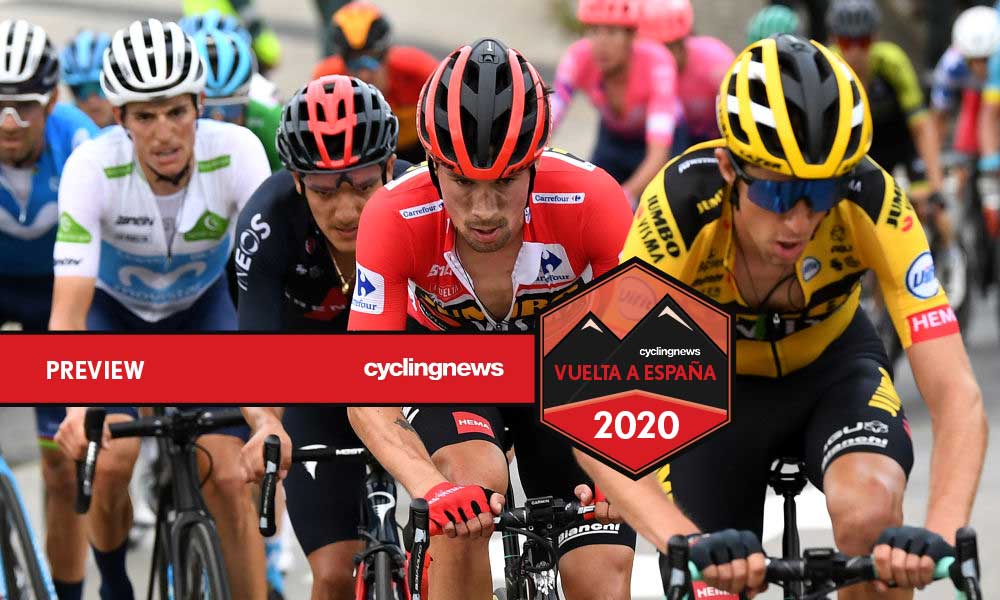Vuelta a España contenders enter final showdown arena
Two tough mountain stages to decide the final race of 2020

The Vuelta a España moves into its final phase of mountain climbing on Friday with the GC still far from decided, even if race leader Primož Roglič (Jumbo-Visma) has the upper hand - arguably team-wise and experience-wise - when it comes to winning Spain's Grand Tour.
The defending champion has a host of tried-and-tested climbing domestiques at his disposal and knows what exactly what it takes to defend a lead at this point in the Tour of Spain, however his advantage over closest pursuer Richard Carapaz (Ineos Grenadiers) is a slender one of 39 seconds.
That is far narrower before the final mountain stages of last year's Vuelta, when Roglič's margin over Nairo Quintana (Movistar) was 2:24. Nor is Carapaz the only challenger at less than a minute: Hugh Carthy (EF Pro Cycling) is at 47 seconds and like Carapaz, has gained time on Roglič in more than one mountain stage of this year's Vuelta.
Furthemore, like Carapaz, Carthy's morale is logically on a high, after all, while Roglič gained time on them in Tuesday's time trial, it was nothing like the kind of differences that he managed to put into his rivals in 2019 in the Vuelta's equivalent race against the clock. Both the Ecuadorian and the Briton have everything to play for in this final round of the Vuelta's mountain games.
The 2020 Vuelta a España's lineup enjoys a massive wealth of top-name outsiders and potential stage winners that was sorely lacking in 2019 and who could well influence how the last two days of GC racing play out.
Dan Martin (Israel Start-Up Nation) is riding a notably strong race overall, lying fourth at 1:42, meaning he cannot be ruled out of that battle by any means. Enric Mas is currently more than three minutes adrift but has a formidable lineup in the Movistar team that could cause some serious disruption.
Then there's the route. The last two stages of the Vuelta a España are far tougher than the last round of the 2019 Spanish Grand Tour - and the first is, bizarrely enough, partly due to the pandemic.
Get The Leadout Newsletter
The latest race content, interviews, features, reviews and expert buying guides, direct to your inbox!
As a result of COVID-19 measures, what had originally been planned as a straightforward flat stage to Ciudad Rodrigo through eastern Portugal was replaced last summer by a much more difficult run through the remote mountains of western Spain. With 2,600 metres of climbing in 162 kilometres, the second-category Portillo after 90 kilometres and the unprecedented first-category Robledo at 36 kilometres from the line, stage 16 of the Vuelta is widely predicted to end with a small group sprint.
That was what happened in 1999 when the race went through the same mountain range and ended after a flat run-in the same finish at Ciudad Rodrigo. That year, Jan Ullrich, en route to overall victory, clinched the stage from a group of 22 riders.
On the other hand, that previous incursion into the little-used Sierras de Francia occurred in the first week of the 1999 Vuelta. This time, the stage comes at a point when the Vuelta is much less about skirmishing, and much more about landing body blows in the final countdown.
"I wouldn't be at all surprised if somebody tried to make a move on Friday's stage," commented double Vuelta a España winner Pedro Delgado during his TVE broadcast. "The last first category ascent is a fair way from the finish, but it's got some very steep sections, and there are some draggy unclassified climbs straight afterwards. Maybe not a full attack, but one to test the water a bit and see how the other GC rivals are going."
"It's not just the Covatilla that's important," Carapaz told Spanish sports daily MARCA before the start of stage 15. "I think things will happen before Saturday, there are teams that will make a move and we will have to be fully focussed."
As for whether he was now tracked more closely because of his Giro d'Italia win last year, making it harder to attack, he answered somewhat tartly, "let's see what happens, Roglič was in that Giro, too.
"We're in the third week of the Vuelta, and we're all feeling increasingly worn down. The Covatilla's the toughest stage but it all adds up," he concluded. "People could crack."
Alasdair Fotheringham has been reporting on cycling since 1991. He has covered every Tour de France since 1992 bar one, as well as numerous other bike races of all shapes and sizes, ranging from the Olympic Games in 2008 to the now sadly defunct Subida a Urkiola hill climb in Spain. As well as working for Cyclingnews, he has also written for The Independent, The Guardian, ProCycling, The Express and Reuters.
